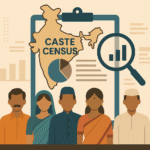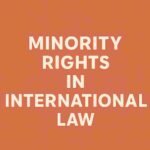Introduction
Human rights in modern times are at the very heart of global conversations on dignity, freedom, equality, and justice. They serve as the moral and legal framework that defines how individuals should be treated by governments, societies, and even private actors. While the concept of human rights can be traced back to ancient philosophies, religious teachings, and natural law theories, their meaning and application have evolved significantly—particularly in the 20th and 21st centuries.
In today’s interconnected and technology-driven world, human rights are no longer limited to protecting individuals from state oppression or physical harm. They now encompass digital privacy, climate justice, gender equality, economic inclusion, and even the right to live in a safe, healthy environment. This transformation reflects the reality that as societies change, the way we understand and protect human rights must also adapt.
But this raises several important questions:
- What exactly are human rights?
- How have they been defined by thinkers, laws, and international treaties?
- In what ways have these rights changed from their traditional form to meet modern challenges?
- What are the biggest threats facing human rights in the 21st century?
To understand human rights in modern times, we must first look at how they are defined by scholars, institutions, and legal frameworks.
What Are Human Rights?
Human rights are the basic freedoms, protections, and entitlements that belong to every person simply because they are human. They are not granted by any government or authority—they are inherent, universal, and inalienable. This means they apply to everyone, everywhere, at all times, regardless of race, religion, ethnicity, gender, nationality, social status, or political belief.
At their core, human rights are about dignity—the recognition that every human being deserves to live with respect, fairness, and freedom. They protect individuals from abuse, discrimination, and oppression while also ensuring access to opportunities that allow people to thrive in society.
In simple, everyday terms, human rights include:
- The right to life and personal safety – protection from violence, torture, and arbitrary killing.
- The right to freedom of speech, thought, and belief – the ability to express opinions, practice any religion, or choose not to practice one.
- The right to education and healthcare – access to essential services that enable personal growth and well-being.
- The right to equality and non-discrimination – ensuring that no one is treated unfairly due to their identity or background.
- The right to participate in society and governance – including the right to vote, join organizations, and have a voice in decision-making.
These principles were formally recognized after the atrocities of World War II when the global community agreed that “never again” should humanity face such widespread injustice. This led to the creation of the Universal Declaration of Human Rights (UDHR), adopted by the United Nations in 1948.
The UDHR is considered the foundation of modern human rights law. It begins with a powerful statement: “All human beings are born free and equal in dignity and rights.” This document set the global standard for how governments and societies should treat their people, influencing countless national constitutions and international treaties.
What Are Human Rights? – Key Definitions
Human rights can be described in many ways, but all definitions share a common idea: they are the basic rights and freedoms that every person is entitled to simply because they are human.
Here are some major definitions:
- United Nations (UN): “Human rights are rights inherent to all human beings, regardless of race, sex, nationality, ethnicity, language, religion, or any other status. They include the right to life and liberty, freedom of opinion and expression, the right to work and education, and many more. Everyone is entitled to these rights, without discrimination.”
- Universal Declaration of Human Rights (UDHR), 1948: “All human beings are born free and equal in dignity and rights.” This foundational document declares that these rights are universal, inalienable, and indivisible.
- Jack Donnelly (Human Rights Scholar): “Human rights are the equal and inalienable rights of all members of the human family. They are held universally, equally, and inalienably by all human beings, by virtue of their humanity.”
- Amnesty International: “Human rights are the basic standards without which people cannot live in dignity. To violate someone’s human rights is to treat them as if they are not human.”
- Harold J. Laski (Political Thinker):“Rights are those conditions of social life without which no man can seek, in general, to be his best self.”
- Meaning: For Laski, human rights are not abstract privileges but essential conditions necessary for individuals to develop their personality and live a meaningful, dignified life. Without these rights, a person cannot achieve their full potential.So, according to Laski, human rights are socially necessary conditions that allow a person to grow, develop, and live freely. This complements the UN definition, which focuses on their universal and inalienable nature, and the UDHR, which frames them as the foundation for dignity and equality.
- Human Rights in modern times are dynamic and evolving, covering not only traditional civil and political freedoms but also digital privacy, environmental rights, and cultural protections.
In essence, human rights are moral principles and legal guarantees that protect individuals’ dignity, freedoms, and well-being.
Core Features of Human Rights
Regardless of how they are defined, all human rights share some key characteristics:
- Universal – They apply to everyone, everywhere.
- Inalienable – They cannot be taken away, except in very specific legal situations (e.g., imprisonment after due process).
- Indivisible & Interdependent – Civil, political, economic, social, and cultural rights are all equally important.
- Protected by Law – Governments have a duty to respect, protect, and fulfill these rights.
From Traditional to Modern Understanding
Traditionally, human rights focused mainly on civil and political rights, such as freedom of speech, protection from torture, and the right to a fair trial. However, as the world became more complex, new types of rights emerged:
- Digital Rights: The right to privacy and data protection in the age of the internet and surveillance.
- Environmental Rights: The right to live in a safe, clean, and sustainable environment.
- Cultural and Identity Rights: Protection for minority groups, indigenous peoples, and LGBTQ+ communities.
- Socioeconomic Rights in a Globalized World: The right to fair working conditions, equal pay, and freedom from extreme poverty.
This evolution reflects the challenges of modern times, where globalization, technology, climate change, and social movements have reshaped how we think about freedom and justice.
Why Human Rights Matter More Than Ever
In the 21st century, human rights are not just moral ideals—they are the foundation of peaceful, democratic, and inclusive societies. Without human rights:
- Inequality and discrimination would deepen.
- Authoritarian regimes could silence dissent.
- Vulnerable communities would have no protection against exploitation.
- Global problems like climate change and mass migration would create even greater injustice.
Therefore, protecting human rights in modern times is not optional—it is essential for human survival and dignity.
Human Rights in the 21st Century – Expanding Beyond the Basics
While the core definition of human rights remains the same, the 21st century has brought new challenges and realities that require an expanded understanding of what these rights mean today.
Modern times have introduced new categories of rights beyond the traditional civil and political freedoms:
- Digital Rights
- The right to online privacy, protection of personal data, and freedom from mass surveillance.
- The right to access the internet and benefit from technology without discrimination.
- Environmental Rights
- The right to live in a clean, safe, and sustainable environment.
- Protection from the harms of pollution, deforestation, and climate change.
- Cultural and Identity Rights
- The protection of indigenous peoples’ traditions, lands, and cultural heritage.
- The right to self-identify, including recognition of LGBTQ+ communities and minority groups.
- Economic and Social Rights in a Globalized World
- Fair labor rights, equal economic opportunities, and protection from extreme poverty.
- The right to benefit from globalization without exploitation.
Human Rights as a Dynamic and Evolving Concept
Unlike fixed legal rules, human rights are dynamic—they evolve with society, technology, and global events. For example:
- The invention of the internet created new debates about privacy and free speech online.
- The climate crisis raised questions about whether people have a right to a healthy planet.
- Artificial intelligence and automation now challenge equality, labor rights, and bias in decision-making systems.
This means that human rights in modern times are not limited to what was written in 1948—they continue to grow as humanity faces new opportunities and threats.
In today’s interconnected world, protecting human rights requires not only national laws but also international cooperation, ethical use of technology, and active participation from civil society.
So, in the 21st century, human rights are not just legal principles—they are living values that adapt to ensure dignity, freedom, and justice for every generation.nd influenced by technology, globalization, and social change.
How Have Human Rights in Modern Times Evolved?
The concept of human rights has always evolved based on historical contexts.
- Ancient and Medieval Ideas: Basic notions of justice and fairness existed in ancient civilizations and religious texts.
- Enlightenment & Revolutions: The 18th century saw the rise of rights declarations, like the French Declaration of the Rights of Man and the US Bill of Rights.
- Post-World War II Era: The horrors of the Holocaust and war crimes led to the creation of the United Nations and the UDHR in 1948.
- Cold War Period: Human rights debates focused on civil and political rights vs. economic and social rights.
- 21st Century ( Human Rights in Modern Times ): Human rights in modern times are about digital privacy, climate justice, refugee protection, and inclusion in a globalized world.
In modern times, we are witnessing new categories of rights:
- Right to internet access and digital privacy
- Right to clean air and water amid climate change
- Right to protection from AI bias and surveillance capitalism
- Right to gender equality and LGBTQ+ dignity
This evolution shows that human rights in modern times are not static—they adapt to new realities.
Major Challenges of Human Rights in Modern Times
While human rights have expanded in meaning, they also face new threats in the 21st century. Let’s look at the biggest challenges of human rights in modern times.
1. Digital Privacy and Surveillance
In the age of technology, personal data is collected, stored, and analyzed by governments and corporations.
- Mass surveillance threatens the right to privacy.
- Social media manipulation spreads misinformation, fueling hate speech.
- Artificial intelligence (AI) can lead to algorithmic discrimination.
Modern states now use technology to monitor citizens—sometimes for security reasons, but often without consent. Thus, digital rights have become a crucial part of human rights in modern times.
2. Freedom of Expression vs Online Hate Speech
The internet gives everyone a voice, but it has also amplified hate speech, cyberbullying, and fake news.
- In many countries, journalists and activists are silenced online through harassment or censorship.
- Some governments use laws against “fake news” to suppress dissent.
- Social media companies struggle to balance freedom of speech with responsibility to prevent harm.
So, protecting freedom of expression in the digital age is more complex than ever.
3. Climate Change and Environmental Rights
Climate change is not just an environmental crisis—it’s a human rights crisis.
- Rising sea levels threaten the right to housing for millions in coastal areas.
- Extreme heat and droughts affect the right to food and water.
- Pollution and deforestation harm the right to health and a safe environment.
Small island nations like Kiribati and Tuvalu face existential threats, leading to questions like: Do people have the right to maintain their nationality if their homeland disappears?
In modern times, the right to a healthy environment is becoming a universal demand.
4. Refugee and Migration Crises
Wars, persecution, and climate disasters are forcing millions of people to flee their homes.
- Refugees often face discrimination, detention, and lack of basic rights.
- Stateless persons have no legal protection under many national systems.
- Migration policies in some countries violate international refugee law.
In modern times, the right to asylum and protection from forced displacement has become a pressing human rights challenge.
5. Gender Equality and LGBTQ+ Rights
While progress has been made in many parts of the world, gender-based violence and discrimination persist.
- Women’s rights are under attack in some countries where access to education, reproductive rights, and equal pay are restricted.
- LGBTQ+ rights are criminalized or socially stigmatized in several nations.
The fight for equal dignity, legal protection, and social acceptance continues to define human rights in modern times.
6. Rising Authoritarianism and Shrinking Civic Space
Across the globe, we are seeing a rise in authoritarian governments that:
- Restrict freedom of assembly and protest
- Suppress journalists, activists, and opposition voices
- Use emergency laws to justify human rights violations
In modern times, even democracies face challenges as populism and nationalism sometimes override international human rights norms.
7. Economic Inequality and Labor Rights
Globalization has created wealth but also deep inequality.
- Gig economy workers often lack basic labor protections.
- Child labor and exploitation still exist in global supply chains.
- Economic inequality undermines access to education, healthcare, and fair wages.
In modern times, the right to decent work and fair economic opportunity is essential for a just society.
Protecting Human Rights in the 21st Century
So, how do we address these modern challenges?
- Strengthen International Law
- Enforce treaties like the Universal Declaration of Human Rights (UDHR) and International Covenant on Civil and Political Rights (ICCPR).
- Expand legal frameworks for digital rights and climate justice.
- Empower Civil Society
- Support NGOs, journalists, and human rights defenders who hold governments accountable.
- Encourage grassroots activism and community participation.
- Use Technology for Good
- Promote ethical AI and privacy-protecting technologies.
- Use digital tools for transparency, fact-checking, and citizen empowerment.
- Global Cooperation
- Countries must work together on climate action, refugee protection, and economic justice.
- Human rights in modern times require a multilateral approach.
Conclusion: The Future of Human Rights in Modern Times
Human rights in modern times are both under threat and expanding in new directions. Technology, globalization, and climate change have transformed the meaning of rights, creating new opportunities but also new risks.
The 21st century demands a dynamic understanding of human rights—one that includes:
- Digital privacy
- Environmental protection
- Economic equality
- Gender and LGBTQ+ inclusion
Protecting human rights in modern times is not just the job of governments—it’s a shared responsibility of global institutions, civil society, businesses, and individuals.
If we fail to adapt, we risk losing the very freedoms that define our humanity. But if we act collectively, we can build a future where human rights truly belong to everyone, everywhere.
FAQs on What are human rights? and Human Rights in Modern Times
1. What are human rights?
Human rights are basic freedoms and protections that belong to every person. They include the right to life, freedom of speech, equality, education, and protection from discrimination. In modern times, human rights also include digital privacy, environmental protection, and the right to access technology.
2. How have human rights in modern times transformed?
In the past, human rights focused mainly on civil and political freedoms like voting and free speech. In modern times, they now include new rights such as digital privacy, climate justice, cultural rights, and protection from AI discrimination. Human rights have expanded to address 21st-century challenges.
3. What are the biggest human rights challenges today?
The major modern human rights challenges include:
- Digital surveillance and loss of online privacy
- Climate change threatening the right to a healthy environment
- Refugee and migration crises
- Gender inequality and LGBTQ+ rights violations
- Authoritarian governments restricting freedoms
- Economic inequality and labor exploitation
4. Why is digital privacy a human rights in modern times?
In the digital age, personal data is constantly collected by governments and corporations. Without privacy protections, people risk surveillance, manipulation, and loss of freedom. Therefore, digital rights—including privacy, data protection, and online freedom—are now seen as essential human rights.
5. How does climate change affect human rights?
Climate change affects basic rights like food, water, health, and housing. Rising seas threaten entire nations like Tuvalu and Kiribati. Extreme weather displaces millions, creating climate refugees. In modern times, the right to a clean and safe environment is recognized as a fundamental human right.
6. Who is responsible for protecting human rights?
Protecting human rights is a shared responsibility of:
- Governments, which must follow laws and treaties
- International organizations, like the UN and Human Rights Council
- Civil society, NGOs, and activists
- Businesses, which must respect labor rights and privacy
- Individuals, who can demand accountability and respect for human dignity
7. What is the future of human rights in modern times i.e. 21st century?
The future of human rights will focus on emerging issues like AI ethics, digital privacy, climate justice, and inclusion of marginalized groups. As technology and globalization evolve, human rights will continue to adapt, ensuring that freedom, equality, and dignity remain protected for all.
For detailed understanding of What are human Rights? and Human Rights in modern times follow RightsRecall.



